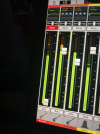I knew it was my mum’s fault!  A nice change from when everything was my fault!
A nice change from when everything was my fault!
Oh - and to the op - be sure you’re right (like don’t take your advice from fans) - and then change or readjust the sound guy. You may get control by turning down etc etc, but the truth of the matter is you could fuck up the music. You need to trust the sound guy - it’s his job to make you sound good.
Thanks
Pauly
 A nice change from when everything was my fault!
A nice change from when everything was my fault!Oh - and to the op - be sure you’re right (like don’t take your advice from fans) - and then change or readjust the sound guy. You may get control by turning down etc etc, but the truth of the matter is you could fuck up the music. You need to trust the sound guy - it’s his job to make you sound good.
Thanks
Pauly
All good points. At almost every gig, the singers girlfriend comes up at some point and says that the singer isn't loud enough. All channels are 'trimmed' to the same input levels. the singer's channel fader is a good 10+ dB above everything else. I see videos of shows all of the time, and he is plenty loud enough.
My mom usually says that I am not loud enough (go figure). I see videos of shows all of the time, and the guitar plenty loud enough.
To the O.P....
Try to listen to as many videos of your shows, different venues, different spots in the room, different recorders, etc... to get a good idea of what is going on with your mix, and how your presets work within it.
Your presets could be the culprit too? You likely have your monitor level on stage relatively louder than the FOH mix will have you. So you won't notice it as much? More 'mids'?

